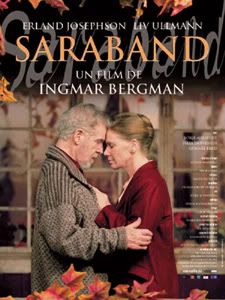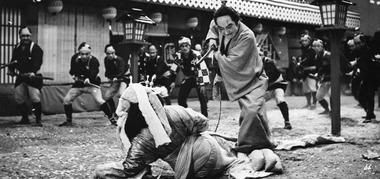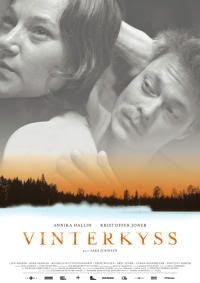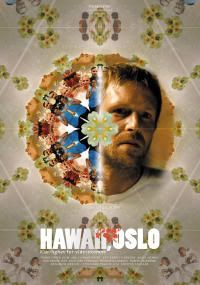And so, 100 words or thereabouts on the films I have seen so far:
Saraband

A film by Ingmar Bergman. My first Bergman—about time for someone who works in the game. Taking up 30 years on from his famous SCENES FROM A MARRIAGE, the 60-ish ex-wife visits her now geriatric husband at his country home and becomes embroiled in a nasty little interation between ex-hubby and his recently-widowed son (who is the same age as his step-mother), and the hotness nordic granddaughter. In ten dialogues, each featuring only two of the characters, a nasty little set of family relationships plays out.
Man, heavy shit. In that heavy sombre Scandinavian way, replete with the hints of incest and outright hatred. The focus is squarely on the acting, and it's blowaway. Extended facial close-ups leave them nothing but the actors' expressions to tell the story through their looks and facial tics. The film is structured dramatically and feels theatrical, two players on a fairly bare stage. But what I dug was the intensity of the performances.
Yoshiwara, the Pleasure Quarter

A genre piece from a 'recently re-discovered' Japanese director, active in the 1950s and 60s. A horribly-disfigured orphan has made-good but can't snare a wife because of his hideousness. He is taken to the pleasure quarter in Edo (Tokyo), where the geisha also shun him, and so the whoremaster sends their latest endentured slave, a common street-whore dressed up, to attend him. Having no hope and no reservations, she acts tenderly towards him, winnng his love. With dollar signs in her eyes, she promises herself to him as his wife, on the proviso he can make her reach the highest level a geisha can, a grand courtesan. And so we watch as our country squire squanders his wealth and reputation on this scheming temptress, the whoremaster swindles him and his friends and backers desert him.
A melodrama indeed. Glorious in technicolour, it brings to mind films like Douglas Sirk's Written on the Wind, all lurid and flambuoyant and overwrought with emotion. Except in a demure, restrained Japanese kinda way, with kimonos, palanquin chairs and funny dances involving fans. And, truth be told, it was a touch on the slow side. It is very much a film of its time, the late 1950s, and as a curiosity/retrospective piece it was pretty solid. Not an undiscovered gem, but a curio of its time.
Kissed by Winter

An uplifting Norwegian film about a woman's grief over the death of her son, all tied up in the mysterious death of an Iranian lad. Just what you'd expect from the Skandinavians—lots of snow, silence, and longing looks. And grief. Or the suspension of it rather. She moves away from her husband to the country to plunge headlong into work and avoid thinking about the death of her kid. Whose poresnce weighs heavy on this film.
This one kinda felt a bit like a telemovie, and particularly dislikeable was the actor who plays the love interest in this snow-covered rural hamlet. Well put together and well-structured, it was somehow light fare, even though its subject was grief. It didn't feel particulalry deep, as opposed Saraband, and it certainly wasn't folly, like Yoshiwara. I spose this was because the whole film concerned the mother's repression of her grief, and continuing to avoid it by focussing on the death of the refugee kid and the investigation into that. The best part was her calling her old answering machine to hear her son's message, over and over again.
Hawaii Oslo

I like films like this. I like stories told in this way (David Mitchell, my lord and master) interwoven plots, intersecting here and there, but not necessarily parallel or even echoing each other. Like some sort of ensemble piece for storylines. Five storylines in fact, each happening on a blisteringly hot day (what, about 29 degrees or something) in Oslo.
The cast were all young and pretty, as only Scandinavians can be—but that was kinda strange, hardly an old codger in sight. And this one was moderately-paced, indeed the fastest paced of the films I have seen so far. It rolled along really nicely, tying the tales together, frustrating you when you needed frustrating, rewarding you when it was required. It's one of those films by hip young things, bit of edgy camerawork here, bit of montage there, and some really great shots littered throughout. Particularly the closing shot of a bird's-eye view of Oslo at dawn.
So if I had to rank them, it'd be
- Saraband—because I'm still thinking about it now
- Hawaii Oslo—because it was the most audience-friendly
- Yoshiwara the Pleasure Quarter —for its colour and its nature as a period-piece
- Kissed by Winter—an undeserving last. Because it was still better than most films I've seen this year: Star Wars anyone?
No comments:
Post a Comment